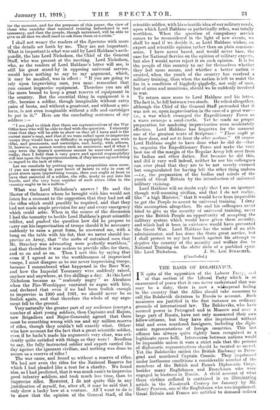THE BASIS OF BOLSHEVISM.
EN spite of the opposition of the Labour Party, ami
of that section of the Liberal Party which is so enamoured of peace that it can never understand that war may be a duty, there is now a widespread feeling in the country that the Allies should take measures to call the Bolshevik dictators in Russia to account. Such measures are justified in the first instance on ordinary grounds of international law. The Bolsheviks, who have secured power in Petrograd and in Moscow and over a large part of Russia, have not only massacred their own fellow-citizens, but they have also imprisoned without trial and even murdered foreigners, including the diplo- matic representatives of foreign countries. This last offence has always quite rightly been recognized as a legitimate cams bell. Intercourse between nations would be impossible unless it were a strict rule that the persons of diplomatic representatives should be treated as sacred. Yet the Bolsheviks raided the British Embassy in Petro- grad and murdered Captain Cromie. They imprisoned under loathsome conditions a considerable number of the members of the British and French Diplomatic Corps, besides many Englishmen and Frenchmen who were engaged in business in Russia. A vivid account of what these victims suffered is contained in an illuminating article in the Nineteenth Century for January by Mr. Henry Pearson, one of the Englishmen who was imprisoned. Great Britain and France are entitled to demand redress for this gross international ontrae'e, and it is clear that they cannot obtain redress without taking stern measures to enforce it. Beyond this, there is the patent fact that the Bolsheviks are adopting an aggressive policy towards the rest of the world. They are ignoring the claim of countries like Esthonia and Poland to separate national existence, and are sending troops into these countries who are plundering, burning, and massacring wherever they go. Surely it is the duty of the Allies, if they have any faith in the doctrine of self-determination that President Wilson has so often put forward, to protect these new nations, or restored old nations, from the tyranny which is overwhelming them. During the winter, while the Eastern Baltic and the White Sea are ice-bound, we cannot undertake military operations there, but we can at least arm the Esthonians and other small peoples so that they may defend themselves against the invading Bolsheviks. On these two grounds, then, the legal and moral case for intervention is clear. Yet intervention is being bitterly opposed both by French and by British Socialists. The reason is not far to seek. Every political party is at all times liable to have its policy dictated by its extremists, and the Socialist Parties in this country as in France are notoriously liable to this particular danger. It is the excitable hot-headed young Socialist who captures the machinery of the Labour Party, and puts forward a policy which the majority of members have never approved, and probably never even understood. As far back as the spring of last year Socialists in this country were openly declaring I hat they stood side by side with the Bolsheviks of Russia. Yet even on that date the Bolsheviks had made clear what their programme and what their methods were. For example, in January, 1918, Krilenko, the Bolshevik Com- mander-in-Chief, addressing a meeting of the Keksholm Guards at Petrograd, said : "We uphold the appeal of the Soviets, and we shall shrink from nothing, not even from spreading wholesale terror and woe to all who attempt to cross our path. We must not spare our enemies." At another' meeting Mute. Spiridonova, President of the Passion Peasant Conference, referring to the shooting in the streets of Petrograd, said that it was impossible to conduct a revolution with kid gloves, and that the recent events must be regarded "as one of the stages towards the full attainment of Socialism." These are samples out of thousands available to show the spirit and methods of t he Russian Bolsheviks ; yet we find our own British Socialists emphatically allying themselves with Russian Bolshevism.
The alliance still continues, and therefore it is worth while to ask what is the common basis which links together these two movements. The first answer is that a good many of our English and Scottish Socialists do not look beyond the fact that the Russian Bolsheviks profess to be a Labour Party. On that ground alone they hold that the Russian movement ought to receive the support of the Labour Party of Great Britain. This, however, is merely a superficial argument. It would not carry permanent weight but for the fact that Socialists in England and Scotland ultimately rely for their driving-force upon the same motive as that to which the Russian Bolsheviks appeal. In one word, that motive is envy. Those who know anything of the personality of Socialists in this country will agree with the statement that the typical English or Scottish Socialist is more influenced by the feeling of envy which the actual organization of society creates in his mind than by his professed desire to regenerate humanity. In practice the typical Socialist is a discon- tented person, easily taking offence, intensely class- conscious. That such persons may have their use in stirring up what Ruskin called "divine discontent" may be admitted without hesitation ; but though discontent in certain phases of society may be justifiable and useful, it ought to be obvious that we cannot build up a new world on a basis of envy.
The events now proceeding in Russia prove this fairly obvious fact, as it was proved in advance a hundred years ago by the French Revolution. Men who are inspired by envy are much more eager to injure the classes above them than to benefit the classes below. Expression is given to this feeling in England, and perhaps even more in Scotland, especially on the Clyde, by the bitter language of the average Socialist. Expression is given to the same feeling in Russia by the wholesale slaughter of the middle and upper classes. That there may be a momentary gain to certain persons previously down-trodden from the violent destruction of those above them is not to be denied. Some of the accu- mulated wealth which the well-to-do classes had in their possession can be distributed among those who were previously starving, and until it has been consumed or wasted a few of the poor will be better off. But the good things which can thus be divided are very quickly exhausted, and then the community i<1 faced with the problem of how to carry on production in order to satisfy its necessary wants. In Russia, in strict accordance with Socialist principles, industries have been nationalized wholesale, and have promptly ceased to be productive. The men who knew how to conduct those industries have been murdered or imprisoned. The workmen have been given to understand that they can draw their pay regardless of the amount of work they do. Thus neither brain- power nor 'muscle-power is effectively available for the hard work of industry. Doubtless the Russian people are peculiarly incapable of evolving a new organization to replace the old, for they are intellectually far more back- ward than the people of Western Europe. But it is equally certain that if Bolshevik methods were applied in Western Europe similar results would ensue. Industry cannot be carried on successfully unless there is, first, brain-power to direct the industry ; secondly, capital to finance it ; and thirdly, men and women who will work fairly honestly and fairly hard. The Socialist scheme of society, as logically interpreted by Russian Bolsheviks, involves, first, the murder of the intellectual classes who alone are capable of directing industry ; secondly, the destruction of the motives which lead to the accumulation of capital ; and thirdly, it tells the workers that they are entitled to large salaries for merely pretending to work. Such principles cause the absolute destruction of the means of producing the wealth necessary for the wants of mankind.
Surely Western Europe is, on grounds of self-defence alone, in addition to the legal grounds above stated, entitled to protect itself against the advance of doctrines which would lead to such a world disaster. In order to provide that protection military measures are essential. For the Bolshevik propaganda, based, as it essentially is, upon the spirit of envy, will easily find favour among the masses of the population in countries suffering from the losses of war. Already the Bolsheviks are confidently counting on winning over to their side millions of Germans whom they expect soon to be suffering from the horrors of un- employment. There will be a good many unemployed also in Austria and in Hungary—all of them willing to listen to plausible orators who tell them that all the troubles of "the People" come from the action of the rich in stealing the property of the poor. It is a specious doctrine in the ears of a poor man who finds himself starving and sees well-to-do people enjoying a comfortable existence. So far, indeed, as the well-to-do ignore the responsibilities which their relative prosperity imposes upon them, there is a quasi-moral justification for this spirit of envy, and it may be that the savagery of the Bolshevik movement in Russia is due not only to the primi- tive mentality of the Russian people, but also to the neglect of their duties by the Russian upper classes before the war. That is, in truth, the lesson which men who were really thinking of the regeneration of mankind would press home. They would urge that pulling down the rich does not lift up the poor ; that it is impossible to secure even by a Bolshevik tyranny the absolute equality of which the Bolsheviks dream ; that inequality is not only an inevitable fact, but within limits a useful stimulus ; and finally, that the only true way of mitigating the hard- ships which must sometimes result from human in- equalities is to insist on the doctrine that those who have shot ahead in the world's race owe a debt of service to those who have fallen behind.



































 Previous page
Previous page